
Summer Marks Next Phase of Construction |
Vaccine Injury Clinic Wins Major Victory |
Worth Noting: The Rankings Update |
Former INS Commissioner Joins Law School Faculty |
Sandra Day O'Connor to Deliver Commencement Address |
Judge Conducts Hearings at GW |
GW Law Hosts International Tax Symposium |
Immigration Clinic Secures Two Victories |
Enrichment Series Brings Several Speakers to Campus |
Multitalented Leader |
Student Achievement |
Van Vleck Winners |
LLM Team Wins Government Contracts Competition |
Experts Discuss Afghan Reconstruction |
Marking 200 Years of Marbury v. Madison |
Debating Media and the Mideast |
Professor and Students Conduct Archaeological Dig in Gettysburg |
Faculty Books
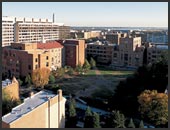
The Law School complex, comprising the left side of the University Yard, will turn the corner and include neighboring Stuart and Lisner Halls to form an "L" around the University Yard. |
Summer Marks Next Phase of Construction
GW Law Acquires and Renovate Stuart Hall
The new phase of the Law School's expansion and renovation project began in April and is scheduled to continue through August. During this phase, the addition of neighboring Stuart Hall will expand the Law School complex around to the G Street side of the University Yard.
Once renovated, Stuart Hall will add approximately 42,000 square feet of office and classroom space to the Law School. With the recently completed Faculty Conference Center on the fifth floor of the 700 20th Street building, in which the dean's suites also were added last year, the addition will increase the net square footage of the Law School complex by 36.5 percent.
Recently completed or soon-to-be completed additions to the Law School complex through these upgrades include:
- Nine new classrooms (two tiered and seven seminar format);
- An additional computer lab, which also serves as a legal research and writing classroom laboratory;
- New homes for key administrative offices, such as the records office and graduate admissions; and
- Faculty offices.
The Stuart addition will:
- Provide a significant increase in student meeting and relaxation space;
- Improve the pedestrian flow through the school;
- Further rationalize the location of administrative offices, allowing for better interoffice communications and improved delivery of student services;
- Allow the Law School to introduce an important new Small Sections program for 1Ls;
- Let course scheduling be determined based on pedagogic considerations rather than classroom availability; and Allow for the renovation and expansion of student lounges.
The entire ground floor of Stockton Hall will be given over to student space. The removal of internal walls will take full advantage of the high ceilings and windows in Stockton, bringing in light from the building's eastern and western exposures and creating a spectacular space. The existing dining lounge will be renovated and doubled, with expanded pantry and vending facilities (accepting GWorld cards) and an ATM machine. The "Soft Lounge" will also double in size, divided by the main corridor, and will offer a variety of seating arrangements for informal meetings and relaxation.
New restrooms are also included in the new design. A security/information desk will be located at the renovated entrance to Stockton Hall. To help with the flow of foot traffic, the Stockton staircase will be redirected to open on two sides into the lounge space instead of the main corridor. The Stockton elevator will also be replaced as part of this project.
And it's not just the interior space that is getting a new look. The Law School's "Streetscape" plan envisions a low capped wall surrounding and unifying the Law School complex, as well as handsome new entrance schemes for Lerner, Stockton, and Burns Halls.

Professor Peter H. Meyers supervises the Vaccine Injury Clinic.
|
Vaccine Injury Clinic Wins Major Victory
Students from the GW Law's Vaccine Injury Clinic won a multimillion-dollar settlement in the case of Dela Rosa v. Secretary of Health and Human Services.
In the case, the clinic petitioned the court for compensation after its client's 10-year-old daughter suffered serious injuries, including brain damage and a seizure disorder, as a direct result of the government-mandated measles, mumps, and rubella vaccination. The U.S. Court of Federal Claims ruled that the client was entitled to a multimillion-dollar compensation settlement, allowing her to remove her daughter from an institution to receive home care.
"This case exemplifies the need for the Vaccine Injury Clinic," says Peter H. Meyers, professor of clinical law and faculty supervisor for the clinic. "Our students were able to successfully represent a client in a difficult case which most lawyers would have never taken."
The clinic is used to dealing with difficult cases, but "this particular case was very complex," Meyers says. "There were no published studies connecting the MMR vaccine with our client's injuries. There- fore, our students had to do comprehensive medical research in addition to preparing for all of the legal issues in the case."
Founded in 1994, the clinic was designed to represent parents seeking vaccine-injury compensation under the National Childhood Vaccine Injury Act of 1986. The clinic is staffed by second- and third-year students who are specially admitted as student-attorneys in the U.S. Court of Federal Claims and work under supervision of Meyers.
"The students do all of the work and have the authority to do everything an attorney would do," Meyers says. "They draft legal petitions, obtain and file medical records with the court, interview experts and witnesses, and do all of the talking in the trials."
Currently the only law school vaccine injury clinic in the country, GW Law's clinic has obtained compensation in a wide variety of cases through negotiation and litigation to ensure that children with severe injuries receive excellent care through the duration of their lives.
Meyers, who has more than 30 years of litigation experience, has argued a number of precedent-setting cases, including oral arguments before the U.S. Supreme Court, which established important standing principles. He also has served as chairman of the Department of Health and Human Services' Childhood Vaccines Workgroup Advisory Commission and has been a designated reviewer by The National Academy of Sciences for multiple publications involving vaccine-related issues.
Worth Noting: The Rankings Update
While the GW Law faculty and administration believe there are many qualities about GW Law that make it impossible to compare it to other schools, it is worth nothing that GW Law moved up in the annual U.S. News & World Report rankings survey listed in its current edition of "America's Best Graduate Schools." The Law School is tied for 22nd on this year's list—moving up from a ranking of 25th last year.
Among law specialities, the environmental law program tied for sixth place, moving up from ninth place. The intellectual property law program is ranked as the nation's second best, while the international law program is ranked sixth in the country.
Additionally, GW Law was recognized as having one of the most racially diverse student bodies in the nation, ranking 18th on the list for "Law School Diversity."
U.S. News has been publishing "America's Best Graduate Schools" annually since 1990. According to the magazine, schools are measured using objective data (obtained by U.S. News) from colleges and universities) and reputational ratings.
Former INS Commissioner Joins Law School Faculty
Former Immigration and Naturalization Service Commissioner James W. Ziglar, BA '68, JD '72, has joined the Law School faculty as a distinguished visiting professor from practice. Ziglar served as INS commissioner until Nov. 30, when he retired from federal service.
“We are thrilled and honored that Jim Ziglar has agreed to join our faculty as a distinguished professor from practice,” says Dean Michael K. Young. “With his extensive experience in the private sector and the example of his years of commitment to public service, he is in a unique position to make a significant impact on our academic community.”
Ziglar has served in the federal government for more than 15 years. In addition to his position at the INS, he served as sergeant at arms of the U.S. Senate, as assistant secretary of water and science at the Department of the Interior—where he oversaw the operations of the Bureau of Reclamation, the Bureau of Mines, and the U.S. Geological Survey—and as a congressional and public affairs officer at the Department of Justice.
Ziglar began his legal career in 1972 as a clerk for former U.S. Supreme Court Justice Harry Blackmun before joining law firms in New York and Phoenix.
Ziglar is teaching classes in immigration policy and constitutional law, as well as courses on natural resources law and policy. “GW has long been a national and community leader in the areas of immigration and environmental law and policy,” Young says. “Adding the talents of someone of Jim Ziglar's background and stature to our existing strengths in these areas will enrich our programs and be of enormous benefit to our students.”
Matthew Nehmer
Sandra Day O'Connor to Deliver Commencement Address
U.S. Supreme Court Associate Justice Sandra Day O'Connor is scheduled to address this year's Law School graduates at Commencement May 25. Nominated by former President Ronald Reagan, O'Connor has served on the nation's highest court since 1981. Prior to her lifetime appointment to the federal bench, O'Connor served on the Arizona Court of Appeals and the Maricopa County Superior Court. In 1969, she was appointed to the Arizona State Senate and subsequently reelected for two consecutive terms. O'Connor began practicing law in 1952 as the deputy county attorney of San Mateo, Calif.
O'Connor, who was born in El Paso, Texas, received two degrees from Stanford University. By speaking at the Law School Commencement, she joins her colleague William Rehnquist, chief justice, who addressed graduates in 2000.
Commencement exercises will begin at 1:30 p.m. in the Smith Center. A reception will be held following the ceremony for all graduates and their guests. For more information on the Law School's Commencement, visit www.law.gwu.edu.
Judge Conducts Hearings at GW
In a special event organized by Professor Lorri Unumb (left), Judge Rufus King, Chief Judge of the D.C. Superior Court (right), conducted motion hearings in the Jacob Burns Moot Courtroom Feb. 28.
Director of the legal research and writing program for the Law School, Unumb organized the event to allow first-year law students, who had just submitted and argued their first motions and were preparing to submit and argue appellate briefs, a chance to see real motion hearings. Rather than taking 400-plus students to court, she invited Judge King to conduct his motion hearings in the newly renovated Jacob Burns Moot Court Room. Judge King obliged and selected three cases to be held at GW that day.
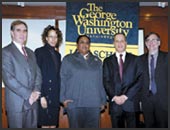
Dean Young, Professor Karen Brown, Barbados Attorney General Mia Mottley, Steven Cantor, and Professor Robert Peroni at the Steven L. Cantor International Tax Symposium
|
GW Law Hosts International Tax Symposium
GW Law hosted the Steven L. Cantor International Tax Symposium Nov. 8.
The symposium, "International Tax Policy Towards Developing Countries," explored policy issues relating to U.S. tax treatment of foreign income. The George Washington International Law Review published the papers presented in the symposium in a special edition.
Associate Dean Susan L. Karamanian and her staff assisted in organizing the conference. The symposium was made possible by the generosity of Steven L. Cantor, JD '75, and was presented free of charge to all attendees.
Speakers included: GW Law Professors Robert Peroni and Karen Brown; Paul McDaniel of the Boston College School of Law; LaBrenda Garrett-Nelson of the Washington Council of Ernst Young; Samuel Thompson of the University of Miami School of Law; Mia Mottley, attorney general of Barbados (keynote speaker); Bruce Zagaris of Berliner, Corcoran & Rowe; Diane Renfroe of Deloitte & Touche; and David Rosenbloom of Caplin & Drysdale.
Immigration Clinic Secures Two Victories
The Law School's Immigration Clinic won two major victories in April-securing asylum for a young woman from the Democratic Republic of Congo and a waiver of deportation for a disabled police officer's wife.
On April 28, GW Law School Immigration Clinic represented a 27-year-old woman from the Democratic Republic of Congo in her removal proceedings before the immigration judge in Arlington, Va. Sara Mostafavi was the student attorney on the case. Under the supervision of Michelle Morales, interim director of the Immigration Clinic and a visiting professor of clinical law, Mostafavi prepared the entire case and represented the client at her hearing. In a lengthy decision, the immigration judge granted asylum to the client based on a well-founded fear of future persecution.
The client and her family were persecuted in the Democratic Republic of Congo, where they were often mistaken for ethnic Tutsis. They were arrested and accused of being rebel sympathizers and traitors for safeguarding the belongings of an ethnic Tutsi neighbor.
The Democratic Republic of Congo has been ravaged by ethnic warfare for many years. The client's two adult brothers, one sister, and her widowed mother had all won asylum in the United States, while her four younger siblings gained asylum as derivatives on their mother's application. The client was the only family member who did not have asylum.
"This family has suffered so much," Morales says. "They deserve the opportunity to overcome their hardships in a country where they are free from fear."
On April 3, GW law student Andrea Barbarin secured a waiver of deportation for her client from Scotland in a hearing before Judge Wayne R. Iskra of the Arlington Immigration Court. The client, whose husband and two daughters are U.S. citizens, had been a lawful permanent resident for more than 11 years and faced deportation as a result of a nonviolent drug offense.
"A compelling aspect of the client's case was that her husband had been awaiting a kidney transplant for six years," Morales adds. "If she was deported, he would have no one to support him through his illness and he would lose his place on the kidney donation list."
With the supervision of Morales, Barbarin helped her client apply for relief under 212(c) of the Immigration and Nationality Act, which allows judges to balance the applicant's crimes against their equities.
In addition to compiling documentation in support of her client's application, Barbarin prepared her client and witnesses by holding a mock hearing where fellow clinical students played the roles of judge, opposing counsel, and representing counsel.
Judge Iskra granted the waiver of deportation without hearing closing arguments or statements from the four other witnesses due to Barbarin's documentation and convincing arguments.
GW's Immigration Clinic has provided legal representation to aliens in the D.C. metropolitan area since 1979.
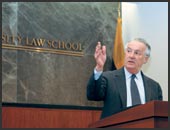
In March, Sen. Paul Sarbanes (D.-Md.) delivered the 23rd annual Manuel F. Cohen Memorial Lecture. Sarbanes presented "The Crisis in Corporate America: The Legislative Response" March 31 in the Jacob Burns Moot Court Room.
|
Enrichment Series Brings Several Speakers to Campus
Organizers of the Law School's Enrichment Program, led by Professor Jeffrey Guttman, outdid themselves in the spring semester, bringing several guest speakers to campus.
In January, Montgomery County, Md., State's Attorney Douglas Gansler presented "The Sniper & Other High Profile Cases: Reflections of a County Prosecutor."
In March, Sen. Paul Sarbanes (D.-Md.) delivered the 23rd annual Manuel F. Cohen Memorial Lecture. Sarbanes presented "The Crisis in Corporate America: The Legislative Response" March 31 in the Jacob Burns Moot Court Room.
In April, the annual Shulman Lecture brought Assistant Attorney General Viet Dinh to campus. He presented " Securing Liberty Against Terrorism: The Justice Department Prevention Paradigm" April 3.
Also in April, GW hosted Cambridge Professor James R. Crawford April 9 for a speech titled "Can the U.S. Avoid the International Criminal Court?" Crawford, Cambridge's Professor of Law, addressed a full audience in the Law School's Faculty Conference Center. Crawford, one of the world's leading international lawyers, is a member of the UN International Law Commission. He was one of the drafters of the Rome Statute.
Now in its 22nd year, the GW Law School Enrichment Program was established to enhance the extracurricular intellectual life of the Law School. Previous speakers include Supreme Court Justices Scalia, O'Connor, Kennedy and Ginsburg; former Senator Bill Bradley; Congressman Barney Frank; columnist George Will; attorney Alan Dershowitz; and Assistant Attorney General Joel Klein.
Multitalented Leader
Dean Young demonstrates his expertise as he takes the commanding role at the grill station on Dean's Jeans Day. During the annual event, the faculty and staff treat the students to an afternoon barbeque.
Student Achievement
The following are some of interscholastic accomplishments GW Law students achieved during this academic year:
- 2003 ABA National Appellate Advocacy (Moot Court) Competition
National Finalists: Jose Venzor and Geoffrey Gettinger
- 2002-03 ABA Law Student Division Negotiation Competition, Regional Competition
Second Place: John Malarney and Daniel L. Nadel
- 2002-03 National Trial Competition (Trial Court Board)
Regional Co-Champions: Rohan Virginkar and Chris Hamner
- 2002-03 American Trial Lawyers Association Mock Trial Competition
Regional Champions: Jason Jowers, Amanda Johnson, Patricia Mantiega, and Sara Michaelchuck
Van Vleck Winners
Jeremy Stein (left) and Joshua Kogan (right) won this year's Vlan Vleck Constitutional Moot Court Competition, held Feb. 6 at GW.
The judges were Judge Reene Raggi of the U.S. Court of Appeals for the Seond Circuit; Judge Patti Saris of the U.S. District Court for the District of Massachusetts; and Judge Richard Stearns of the U.S. District Court for the District of Massachusetts.
This year's problem involved a challenge to the constitutionality of the Pledge of Allegiance. In the past, the Vlan Vleck problem has dealt with the constitutionality of various search and seizure procedures under the Fourth Amendment and the scope of Congress' legislative power under the Commerce Clause.
The competition began in September, when 68 upper-level law students began researching the problem. Each team of competitors was required to submit and present oral arguments from both the petitioner's and respondent's side, requiring a thorough knowledge of the issues involved. During the oral argument stage, each team argued before panels that included practicing attorneys.
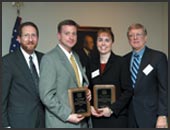
Winning team (center) Sean Sabin and Rebecca Vernon, faculty adviser (left) Steve Schooner, and sponsor (right) Sandy Hoe of McKenna Long & Aldridge
|
LLM Team Wins Government Contracts Competition
After successfully navigating four preliminary and semifinal arguments April 8, GW Law students competed in the final round of the Gilbert A. Cuneo Government Contracts Moot Court Competition. In front of a packed gallery at the U.S. Court of Federal Claims, the contestants argued before a demanding bench of current and retired judges.
As expected, the competition was intense. After the arguments, participants, judges, friends, family, and classmates reconvened for a spirited reception and prize ceremony at the offices of McKenna Long & Aldridge, the competition sponsor.
For the first time, a team of LLM candidates, Sean Sabin and Rebecca Vernon, won the competition. (Sabin and Vernon also authored the competition's best briefs, which will be published in the GW's Public Contract Law Journal.) The winning JD team was Chung-Hi Yoder and Tim Powderly. Along with Jennifer Zucker, Tim Powderly also received a special award for excellence in oral advocacy. Guillermo Santiso received a special award for his written advocacy, and Andre Mura, Deirdre Roney, and Alyssa Schindler were recognized for their outstanding individual achievements.
Experts Discuss Afghan Reconstruction
In January, GW Law and the U.S. Commission on International Religious Freedom convened an international forum on the reconstruction of Afghanistan.
Distinguished speakers included Zalmay Khalilzad, special presidential envoy to Afghanistan and ambassador-at-large to Free Iraqis; Sen. Chuck Hagel (R.-Neb.), sponsor of the Afghanistan Freedom Support Act and member, Senate Foreign Relations Committee; and Andrew Natsios, administrator, U.S. Agency for International Development.
Participants discussed how the protection of religious freedom and other human rights can be incorporated into Afghanistan's new constitution, judicial system, and laws; how tolerance can be instilled in a society that has known enmity and war for the last 30 years; and what the United States can do to assist.
Dean Young (pictured here among other speakers) participated in many of the discussions. GW's Karl Inderfurth, professor of international affairs at GW's Elliott School of International Affairs and former assistant secretary of state for South Asian affairs, also participated.
The U.S. Commission on International Religious Freedom was created by the International Religious Freedom Act of 1998 to give independent policy recommendations to the executive branch and to Congress.
Dean Young has served as chairman of the commission and currently serves as vice chairman.
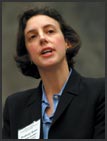
Professors Renee Lettow Lerner and Arthur Wilmarth, who presented during the panel, "Judicial Review Before John Marshall," were two of several GW Law professors who participated in the symposium. Others were Mary Cheh, Brad Clark, John Molot, Peter Raven-Hansen, Robert Cottrol, Michael Matheson, and Susan Karamanian.
|
Marking 200 Years of Marbury v. Madison
On April 10 and 11, GW Law hosted "Marbury and its Legacy," a two-day symposium featuring a distinguished group of legal historians and constitutional scholars who explored the continuing 200-year legacy of the landmark Marbury v. Madison Supreme Court decision. The event was sponsored by The George Washington University Law Review and The George Washington International Law Review.
Symposium speakers were legal scholars and historians from more than 15 universities, including the University of Chicago, Yale University, New York University, Columbia University, Stanford University and The George Washington University.
Other speakers included Maeva Marcus, of the Supreme Court Historical Society; Charles F. Hobson, editor of The Papers of John Marshall; and Nadine Strossen, president, American Civil Liberties Union.
Chief Justice John Marshall's opinion in Marbury v. Madison in 1803 remains one of the most significant decisions ever rendered by the Supreme Court. By recognizing the Supreme Court's authority to declare acts of Congress unconstitutional if they exceed the powers granted by the Constitution, Marbury is credited with helping to more firmly establish the principle of judicial review in the American legal system, and thereby putting the federal judiciary on an equal footing with the political branches.
During the course of the two-day symposium, a variety of scholars considered the historical context of Marshall's opinion, its place in the American constitutional scheme, and the role of judicial review in other national legal systems.
Debating Media and the Mideast
Mike McCurry, press secretary to President Bill Clinton and the State Department (left), and Mark Regeve, spokesman for the Embassy of Israel (right), debate the impact of public diplomacy and media nuance in relation to the Isreali-Palestinian conflict at a March 10 event the Law School.
The symposium explored the power of communication and the intentionality behind the very carefully chosen words used by both government officials and private news outlets. In addition to McCurry and Regeve, other speakers were Janine Zacharia, Washington bureau chief of the Jerusalem Post, and GW Professor Bernard Reich.
The event was co-sponsored by the GW Jewish Law Students Association, the Jewish Student Association, GW's Hillel, GW's Community Living and Learning Center, and Alpha Epsilon Pi Fraternity.
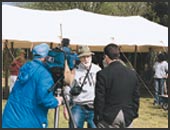
Starrs is interviewed by local media in Gettysburg, Pa.
|
Professor and Students Conduct Archaeological Dig in Gettysburg
Team Attempts to Locate Graves of Two Long Lost Confederate Soldiers
James E. Starrs, professor of law and forensic sciences at GW, led a team of experts and student volunteers in a weeklong archaeological excavation at The Daniel Lady Farm in Gettysburg May 12-16. The crew attempted to locate the remains of two long-lost Confederate soldiers.
Caught in the crossfire of the American Civil War, The Daniel Lady Farm served as a field hospital and makeshift gravesite by the Confederate Army during the historic three-day Battle of Gettysburg. A total of nine burial sites were created, seven of which were exhumed and relocated 10 years later. Starrs and his team intended to locate and examine the remaining two sites and account for any additional graves that may exist.
On a previous visit to the farm, Starrs and his team discovered two human bones and identified several promising dig sites. Starrs' team used ground penetrating radar and Eagle, a specially trained human-bone sniffing dog, which was most recently used to locate the remains of Chandra Levy in Washington's Rock Creek Park.
"The scientific goals of this project included not only locating the remains of Confederate soldiers who died in the Battle of Gettysburg," Starrs says, "but the identification of them by DNA to Confederates whose units were embattled in the vicinity of The Daniel Lady Farm and who are still unaccounted for."
Starrs previously directed a number of other scientific investigations into historic events, including the Boston Strangler, the Lindbergh kidnapping, the Sacco and Vanzetti robbery-murders, the Alfred Packer cannibalism cases, the assassination of Senator Huey Long, the hatchet murders of the Bordens, the CIA-LSD related death of Frank Olson, the identification of Jesse James, the death of Meriwether Lewis and the location of the remains of Samuel Washington.
Faculty Books:
Murder and the Reasonableness Requirement
A self-described "progressive Asian American law professor who cares about issues concerning race, gender, and sexual orientation," Professor Cynthia Lee is used to maintaining flexibility of viewpoint when studying law. While completing her first book, Murder and the Reasonable Man: Passion and Fear in the Criminal Courtroom (New York University Press, 2003), Lee found she must also be versatile as a writer.
What began as a work on race and discretion in the criminal justice system evolved into an examination of social attitudes regarding race, sexual orientation, and masculinity, and how they can affect murder cases.
After starting her research, Lee realized there was much she wanted to do. "I had to decide 'What is manageable now?' and that was a book on race, dominant social norms, questions of heterosexuality and masculinity, and how all these affect the reasonableness requirement," she says.
In the book, Lee presents examples of how it is possible for majority-culture defendants, such as white men, to successfully plea provocation or self-defense in murder cases and have the charges reduced to manslaughter or dropped because of society's views of what is "normal." It is these dominant social norms, such as masculinity, heterosexuality, and race, Lee says, that bolster the defendants' claims of reasonableness.
When cases involve a female victim suspected of infidelity, or if the victim is a homosexual or of a different race than the defendant, Lee says it is somewhat common for a white male to prove the reasonableness requirement and receive a lighter sentence. Incongruently, if the defendant is a woman, a homosexual male, or a member of a minority group, Lee says it is harder to prove that his or her act of violence was committed in self-defense or a result of provocation.
Lee offers three possible legal reforms to address the problems presented in her book.
"I ask people to use role-switching when considering these cases," she says, suggesting that if a jury considers the facts of the case and imagines that the defendant and victim are of different genders, races, or sexual orientations, it is possible to reach a different conclusion about whether the defendant meets the reasonableness requirement.
Ultimately, Lee suggests, the true solution lies in a change in social attitudes.
Laura Ewald
Getting What You Want
Whether it is working out the kinks in a new job contract or haggling over the price of an antique dresser at a flea market, the mere thought of negotiating creates such a dread in some people that they often stop dead in their tracks without attempting to barter for the best deal. But law professor Charles Craver argues that negotiating is a part of everyday work and home life and, in his book The Intelligent Negotiator (Prima Venture, 2002), he walks weary negotiators through the step-by-step process on how to get what they want.
Drawing on his more than 25 years of experience in teaching negotiation strategies to more than 60,000 professionals, Craver explains the basic principles and rituals of negotiating, and he also provides a practical guide that breaks the process of negotiation into five stages.
Craver begins by outlining everything from what types of questions readers should ask, to what they should wear, and where they should sit during negotiations. He continues by explaining the importance of building rapport, setting the tone, and clearly exchanging information during negotiations. By using real life anecdotes, he shows readers how to apply the different negotiating techniques he describes.
"The Intelligent Negotiator is a must read for anyone looking to maximize his success in competitive business," Leigh Steinberg, sports attorney and CEO of Assante Sports Management, says. "It brims with compelling strategies for achieving superior results."
Elizabeth Crawford
Back to top | Spring 2003 Table of Contents
|